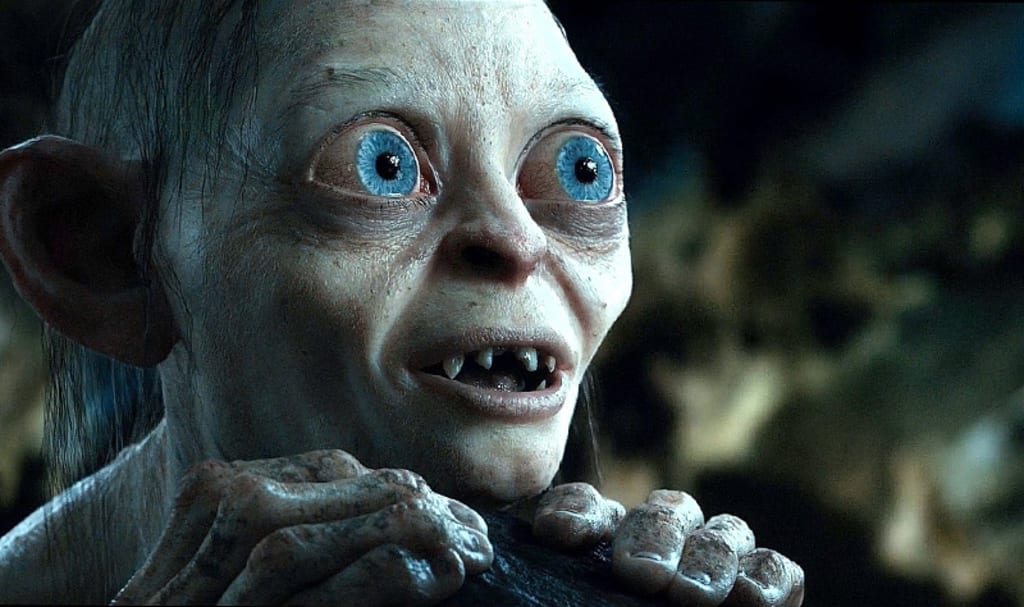Gollum: A Warning to Us All
This is an observation of just how much this fictional character's fall and corruption can easily become a story about ourselves.

As many of you know from The Lord of The Rings franchise, a gangling creature named Gollum, former owner of the McGuffin of the story, the ring of power, wasn't always the way he was. I'm sure I'm going to butcher the plot in one way or another, but from Gollum's history we find out he was once a simple-living, nature loving-creature closely related to hobbits, once named Sméagol, whose biggest concern as he went fishing with his cousin Déagol on his birthday was likely what type of beer would pair well with their catch. Déagol gets a strike and as he's about to pull it in, he himself is pulled into the water. The One Ring of Power is discovered for the first time in some thousands of years later after its last owner, King Isildur from Gondor, becoming possessed by the ring's will almost the second he saw it, refused an order to destroy it in the fires of Mount Doom, and was later ambushed and killed by a company of orcs .
Déagol forgets all about the fish now that he's found the ring. He exits the water and examines what he's just found. One can only imagine what must be going through his head as he stares deeply into the ring's gold. Sméagol catches up to him on the shore, and within seconds, he too is seduced by it. Sméagol demands the ring from Déagol, and what had started as a peaceful day of fishing between cousins, changed in a matter of seconds into a fight for survival over a ring.
Sméagol overpowers Déagol and coldly and somewhat savagely chokes the life out of him. Once Déagol is dead, Sméagol pries the ring out of his hand. He seems to be in ecstasy as he holds it, and says the two words forever associated with him for the very first time. "My Precious."
It's clear that Sméagol's actions devastated and angered his family and community, resulting in his banishment from everything and everyone he'd ever known or loved. Left alone and totally to his own devices, the ring has become his everything. Possessing the ring, and vice-versa for over 500 years, the ring sustains his life well beyond that of what's natural for the kind race of hobbit he is. It provides him a sense of security and comfort by forming a entirely different identity within his own mind, who he can talk to and interact with. But bearing the most evil object in middle-earth, the very soul of The Dark Lord Sauron, twisted his body and his mind to where Sméagol as he once was, no longer exists.
The malformation his body endures because of the ring gives him a persistent cough that sounds like he says "GOLL UM GOLL UM," which soon becomes what he'll forever be known as. He seethes in pain, both loving and hating the ring for what it's done to him, yet protects it suspiciously and even violently. He looks less, well, human and begins to change into a shriveled gangling version of himself. He forgets simple things he once took for granted like the taste of bread or finding peace in the forest. Sméagol even forgets his name.
The author of The Lord Of The Rings, J.R.R Tolkien, was known for his dislike of allegory, the hiding political or moral subtext within the contents of a story. He instead chose to lean more toward applicability, meaning of course you can relate what happens in a story, to events or ideas in your own life. However the character of Gollum represents both allegory and applicability in equal measure. And in his addiction, dissociative identity disorder, self love and loathing, and the extreme physical alteration he undergoes because of the ring, a once strong man reduced to a gangling sickly shell of his former self, we see a character that is for better or worse, quite human.
Being that his creator was Roman-Catholic, understanding Gollum from a religious point of view, he represents the dehumanization and corruption that results from a life spent in sin. The sin in this case being the greed, lust, and wrath Gollum would regard the ring with, even to the point of murder. The loss of identity, innocence, sanity, values, and love makes Gollum a sobering warning that this could be us. And under the right conditions, and wrong choices, this WILL be us. Still in the Christian point of view however, Tolkien reminds us that we have no right to judge.
The Ring itself can be applied to all the things we covet or idolize in life. A profession, person, place, thing, or idea we pursue no matter the cost or what has to be done to get this "whatever: we're after. And just like in the nature of addiction, we start to feel we can't function without this whatever in our life. And just like how the ring sucks the happiness, sanity, physical being, and eventually life out of Sméagol, this "whatever" can lead us down a path we wouldn't normally go, into a lifestyle that can quickly or slowly, turn us into a ruined version of what we once were, and what we're meant to be.
Judging is almost a reflex or an impulse in all of us. We see someone who appears to be a complete wreck and before we even know their situation or their past, we judge them as one thing or another. Frodo Baggins makes this mistake when he sees Gollum for the first time. His Uncle Bilbo had likely told him the story of his encounter with Gollum, and now he sees him for himself. "It's a pity Bilbo didn't kill him when he had the chance!" Frodo says to Gandalf.
The Lord Of The Rings franchise is only a small portion of the mythology of middle earth, Gollum and the one ring being only a small portion of it. But perhaps Tolkien's purposes for creating such a character is to ask ourselves how we respond to the very real Sméagol/Gollum's in our own lives. And even more sobering question as to whether we're becoming just like him. Our divided natures, combined with our tendency to idolize anything, can lead us into doing things we normally wouldn't. And as Gandalf basically tells Frodo, judgement solves nothing and we shouldn't be so eager to delve it out.
"It was pity that stayed Bilbo's hand," Gandalf replies. Tolkien offers the solution in this line. Pity. A quality lacked by all. But if we ever hope to make this world a better place, instead of judging the one's life has broken down the most, a shred of pity might just be the way to start.
About the Creator
Benjamin Alexander House
Just a 29 year old writer trying to do what I do, MAYBE earn some cheddar, and hopefully encourage, warn, amuse, and help people with the power of words. One weird dude, with a beard.......dude.






Comments (1)
Smeagul is a representation of Jesus in Hell for three days of eternal punishment. When Smeagul says "We hates it forever," which he says fairly often he is talking about the ring of power that destroyed his life and made him into a wretch, living under the Lonely Mountain in Mordor. Gollum/Smeagul had been living in Mordor. 500 years in Mordor. He is the great hero that gets no credit. He knew the way to Mount Doom and showed Frodo and Sam how to get there. Smeagul saved Frodo at the Dred Marshes. And actually even though Frodo is a great hero for carrying the ring so far, it was Smeagul who destroyed the ring. It was a suicide. He hates the ring of power. Smeagul destroys the ring in a suicide. Smeagul is a tortured great hero that gets no credit. ...Nathan